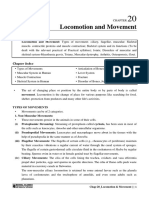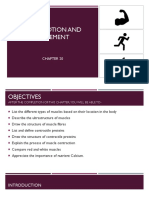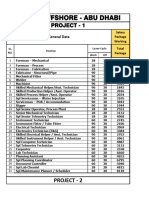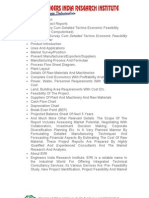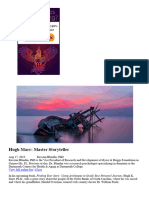0 ratings0% found this document useful (0 votes)
17 viewsWa0038
Wa0038
Uploaded by
Shehzad QureshiThe document summarizes the structure and components of skeletal muscle fibers. It notes that skeletal muscle fibers are composed of sarcolemma, myofibrils, actin and myosin filaments, Z disks, sarcomeres, titin filaments, sarcoplasm, and sarcoplasmic reticulum. The myosin and actin filaments overlap within the myofibrils to form light and dark bands that are important for muscle contraction through cross-bridge cycling interactions.
Copyright:
© All Rights Reserved
Available Formats
Download as PPTX, PDF, TXT or read online from Scribd
Wa0038
Wa0038
Uploaded by
Shehzad Qureshi0 ratings0% found this document useful (0 votes)
17 views10 pagesThe document summarizes the structure and components of skeletal muscle fibers. It notes that skeletal muscle fibers are composed of sarcolemma, myofibrils, actin and myosin filaments, Z disks, sarcomeres, titin filaments, sarcoplasm, and sarcoplasmic reticulum. The myosin and actin filaments overlap within the myofibrils to form light and dark bands that are important for muscle contraction through cross-bridge cycling interactions.
Original Description:
dpt
Original Title
DOC-20190413-WA0038
Copyright
© © All Rights Reserved
Available Formats
PPTX, PDF, TXT or read online from Scribd
Share this document
Did you find this document useful?
Is this content inappropriate?
The document summarizes the structure and components of skeletal muscle fibers. It notes that skeletal muscle fibers are composed of sarcolemma, myofibrils, actin and myosin filaments, Z disks, sarcomeres, titin filaments, sarcoplasm, and sarcoplasmic reticulum. The myosin and actin filaments overlap within the myofibrils to form light and dark bands that are important for muscle contraction through cross-bridge cycling interactions.
Copyright:
© All Rights Reserved
Available Formats
Download as PPTX, PDF, TXT or read online from Scribd
Download as pptx, pdf, or txt
0 ratings0% found this document useful (0 votes)
17 views10 pagesWa0038
Wa0038
Uploaded by
Shehzad QureshiThe document summarizes the structure and components of skeletal muscle fibers. It notes that skeletal muscle fibers are composed of sarcolemma, myofibrils, actin and myosin filaments, Z disks, sarcomeres, titin filaments, sarcoplasm, and sarcoplasmic reticulum. The myosin and actin filaments overlap within the myofibrils to form light and dark bands that are important for muscle contraction through cross-bridge cycling interactions.
Copyright:
© All Rights Reserved
Available Formats
Download as PPTX, PDF, TXT or read online from Scribd
Download as pptx, pdf, or txt
You are on page 1of 10
Dr.
Muhammad Uzair Rehman
About 40 percent of the body is skeletal
muscle, and perhaps another 10 percent is
smooth and cardiac muscle.
Each fiber extends the entire length of the
muscle.
Except for about 2 percent of the fibers, each
fiber is usually innervated by only one nerve
ending, located near the middle of the fiber.
The Sarcolemma Is a Thin Membrane
Enclosing a Skeletal Muscle Fiber:
◦ sarcolemma consists of a true cell membrane,
called the plasma membrane, and an outer coat
made up of a thin layer of polysaccharide material
that contains numerous thin collagen fibrils.
◦ At each end of the muscle fiber, this surface layer
of the sarcolemma fuses with a tendon fiber.
Each muscle fiber contains several hundred to
several thousand myofibrils
Each myofibril is composed of about 1500
adjacent myosin filaments and 3000 actin
filaments, which are large polymerized
protein molecules that are responsible for the
actual muscle contraction.
The myosin and actin filaments partially
interdigitate and thus cause the myofibrils to
have alternate light and dark bands.
light bands contain only actin filaments and
are called I bands because they are isotropic
to polarized light. The dark bands contain
myosin filaments, as well as the ends of the
actin filaments where they overlap the
myosin, and are called A bands because they
are anisotropic to polarized light.
Small projections from the sides of the
myosin filaments are cross bridges It is the
interaction between these cross-bridges and
the actin filaments that causes contraction.
Ends of the actin filaments are attached to a Z
disk. From this disc, these filaments extend
in both directions to interdigitate with the
myosin filaments.
Z disk, which is composed of filamentous
proteins different from the actin and myosin
filaments, passes crosswise across the
myofibril and also crosswise from myofibril to
myofibril, attaching the myofibrils to one
another all the way across the muscle fiber.
The portion of the myofibril (or of the whole
muscle fiber) that lies between two successive
Z disks is called a sarcomere.
Titin Filamentous Molecules Keep the Myosin
and Actin Filaments in Place
Sarcoplasm Is the Intracellular Fluid between
Myofibrils
◦ containing large quantities of potassium,
magnesium, and phosphate, plus multiple protein
enzymes.
Sarcoplasmic Reticulum Is a Specialized
Endoplasmic Reticulum of Skeletal Muscle
This reticulum has a special organization that
is extremely important in regulating calcium
storage, release, and reuptake and therefore
muscle contraction.
You might also like
- Invisible Sun - 03 The WayDocument126 pagesInvisible Sun - 03 The WayAlexandre AmorimNo ratings yet
- Unit 3 - Muscular Physiology HandoutDocument10 pagesUnit 3 - Muscular Physiology Handouttilahun aligazNo ratings yet
- Contraction of Skeletal MuscleDocument64 pagesContraction of Skeletal MuscleFhrecy Ann ConsularNo ratings yet
- 3D. Muscle TissueDocument47 pages3D. Muscle Tissuejaf123xyNo ratings yet
- Microscopic Anatomy of A Skeletal Muscle FiberDocument33 pagesMicroscopic Anatomy of A Skeletal Muscle FiberKumar MSNo ratings yet
- Muscular SystemDocument9 pagesMuscular SystemYasmin Claire NavarroNo ratings yet
- Revision Notes On Locomotion and Movement For NEET 2024 - Free PDF DownloadDocument11 pagesRevision Notes On Locomotion and Movement For NEET 2024 - Free PDF DownloadHaider KaziNo ratings yet
- Locomotion and MovementDocument9 pagesLocomotion and Movementpoojari.dedeepyaNo ratings yet
- 589bc774 Df1d 47c6 Bc97 B5fd73030ca6muscle PhysiologyDocument3 pages589bc774 Df1d 47c6 Bc97 B5fd73030ca6muscle PhysiologyMalti SharmaNo ratings yet
- Muscle Physiology 2023Document69 pagesMuscle Physiology 2023felixwekesa097No ratings yet
- Muscular TDocument18 pagesMuscular TSumayya KabeerNo ratings yet
- Skeletal MusclesDocument7 pagesSkeletal MusclesAhmed OudahNo ratings yet
- Skeletal MuscleDocument7 pagesSkeletal Muscleshahanashameer121No ratings yet
- Muscle Tissues LectureDocument37 pagesMuscle Tissues Lecturefpmorante3596antNo ratings yet
- Physiology of Skeletal & Smooth MusclesDocument10 pagesPhysiology of Skeletal & Smooth MusclesAli AlhamadNo ratings yet
- LPT 321Document103 pagesLPT 321rahul roshanNo ratings yet
- Muscle Tissue: - Skeletal Muscle - Cardiac Muscle - Smooth MuscleDocument36 pagesMuscle Tissue: - Skeletal Muscle - Cardiac Muscle - Smooth MuscleDentist Dina Samy100% (1)
- Muscle Tissues LaboratoryDocument22 pagesMuscle Tissues Laboratoryfpmorante3596antNo ratings yet
- Fungsi Sistem OtotDocument8 pagesFungsi Sistem OtotMahesha RamadhaniNo ratings yet
- Excitable Tissues 1Document8 pagesExcitable Tissues 1gojaisaiah787No ratings yet
- Topic 7 Muscular SystemDocument7 pagesTopic 7 Muscular SystemMary Ann Morillo TenederoNo ratings yet
- Muscular TissueDocument65 pagesMuscular TissueMitzel SapaloNo ratings yet
- Muscle Contraction NotesDocument13 pagesMuscle Contraction NotesBEST COMMUNICATIONSNo ratings yet
- Muscle Lecture On (Excitable Tissue)Document126 pagesMuscle Lecture On (Excitable Tissue)Muhammed ZainabNo ratings yet
- Muscular System (Anatomy and Physiology)Document116 pagesMuscular System (Anatomy and Physiology)Gina Marie CadavosNo ratings yet
- 4.muscle PhysiologyDocument96 pages4.muscle Physiologyruchitiwari1541998No ratings yet
- Skeletal MuscleDocument3 pagesSkeletal Musclekrystal1994No ratings yet
- B Muscle Tissue HistologyDocument55 pagesB Muscle Tissue HistologyAffie SaikolNo ratings yet
- Locomotion and MovementDocument9 pagesLocomotion and MovementvaishnavisdexamNo ratings yet
- Muscles Lecture For AnatomyDocument56 pagesMuscles Lecture For AnatomyJennifer FirestoneNo ratings yet
- MusclesDocument29 pagesMusclesMaaz KhanNo ratings yet
- Locomotion & Movement (Muscles)Document41 pagesLocomotion & Movement (Muscles)DEEPANKAR SAHANo ratings yet
- Cy To SkeletonDocument23 pagesCy To SkeletonDr. Muhammad Ateeq QureshiNo ratings yet
- MuscleDocument11 pagesMuscleJeff ParkNo ratings yet
- Physiology of Muscle For AnaestDocument96 pagesPhysiology of Muscle For AnaestBahredin AbdellaNo ratings yet
- Classification of MusclesDocument50 pagesClassification of MusclesNoor HaleemNo ratings yet
- 6.muscular TissueDocument40 pages6.muscular Tissuemero wowNo ratings yet
- Cytoskeleton MADocument22 pagesCytoskeleton MAsema raraNo ratings yet
- Lecture 6 (Skeletal System)Document8 pagesLecture 6 (Skeletal System)shantmannpsycareNo ratings yet
- Functional Anatomy - ContentDocument14 pagesFunctional Anatomy - ContentxanaduNo ratings yet
- Lec#5 Muscles AnatomyDocument44 pagesLec#5 Muscles Anatomyhk9976614No ratings yet
- Muscles PhysiologyDocument41 pagesMuscles Physiologytealempo80No ratings yet
- MusclesDocument57 pagesMusclesLast AccNo ratings yet
- ANPH Midterm NotesDocument44 pagesANPH Midterm NotesClaudine Jo B. TalabocNo ratings yet
- (L2) - Locomotion and Movement - Sept 25, 2019 - WednesdayDocument45 pages(L2) - Locomotion and Movement - Sept 25, 2019 - WednesdayRofiul HussainNo ratings yet
- Contractile CellsDocument116 pagesContractile Cellsnav_malhiNo ratings yet
- MUSCLE (2)Document135 pagesMUSCLE (2)akpakwuisaac3No ratings yet
- Histology of MuscleDocument49 pagesHistology of MuscleTewachew Dessie100% (1)
- Locomotion and Movement Notes Grade 11Document15 pagesLocomotion and Movement Notes Grade 11brahmatej99No ratings yet
- Muscle PhysiologyDocument24 pagesMuscle PhysiologyArmando AlehandroNo ratings yet
- Chap-20 - Locomotion & MovementDocument52 pagesChap-20 - Locomotion & MovementMittal SavaniNo ratings yet
- Muscle PhysiologyDocument34 pagesMuscle Physiologymadeha goharNo ratings yet
- Muscle Tissue Slides C 20152016Document39 pagesMuscle Tissue Slides C 20152016brennan12345No ratings yet
- Skeletal Muscle StructureDocument38 pagesSkeletal Muscle Structuretoyy100% (1)
- The Muscular SystemDocument9 pagesThe Muscular SystemKathleenJoyGalAlmasinNo ratings yet
- Muscle DentalDocument74 pagesMuscle Dentalapi-3710331No ratings yet
- Organization of Skeletal MuscleDocument16 pagesOrganization of Skeletal Musclesubadubi2005No ratings yet
- Chapter 7 - Muscular SystemDocument29 pagesChapter 7 - Muscular Systeml100% (1)
- Ultra Structure of Muscle CellsDocument3 pagesUltra Structure of Muscle CellshmnwajidNo ratings yet
- Locomotion and MovementDocument58 pagesLocomotion and MovementdddNo ratings yet
- CFC Pakistan - Organizational ProfileDocument10 pagesCFC Pakistan - Organizational ProfileShehzad QureshiNo ratings yet
- Response Essay (Huzaifa Ali Khan) - 1Document2 pagesResponse Essay (Huzaifa Ali Khan) - 1Shehzad QureshiNo ratings yet
- CFC - 9 Skills With BriefDocument3 pagesCFC - 9 Skills With BriefShehzad QureshiNo ratings yet
- Candidates For ElectionsDocument1 pageCandidates For ElectionsShehzad QureshiNo ratings yet
- Excel VlookupDocument3 pagesExcel VlookupShehzad QureshiNo ratings yet
- Replacement of Mid-Term Examination Introduction To Computer Applications - Mid Term ProjectDocument1 pageReplacement of Mid-Term Examination Introduction To Computer Applications - Mid Term ProjectShehzad QureshiNo ratings yet
- Two Voice: BC) - The Archeological Structure of MOHEN-JA-DARO in Larkana Is Evident in Its Records. TheDocument2 pagesTwo Voice: BC) - The Archeological Structure of MOHEN-JA-DARO in Larkana Is Evident in Its Records. TheShehzad QureshiNo ratings yet
- Pakistan History Course Plan 2021Document3 pagesPakistan History Course Plan 2021Shehzad QureshiNo ratings yet
- Historiography of PakistanDocument2 pagesHistoriography of PakistanShehzad QureshiNo ratings yet
- Assignment Qs 1 - Journalization and PostingDocument2 pagesAssignment Qs 1 - Journalization and PostingShehzad Qureshi100% (2)
- Assignment 4 - Merchandising OperationsDocument2 pagesAssignment 4 - Merchandising OperationsShehzad QureshiNo ratings yet
- Conveyor ExDocument1 pageConveyor Extdkhiem02No ratings yet
- Draft Contract To SMDCDocument3 pagesDraft Contract To SMDCKrisna MacabentaNo ratings yet
- VDC hd3xxx NTSCDocument2 pagesVDC hd3xxx NTSCbogtudorNo ratings yet
- The Temple Vindhyachal, A Shakti PeethDocument2 pagesThe Temple Vindhyachal, A Shakti Peethvrohit308No ratings yet
- Grade 6 - Subject Science - Topic Measurement and Motion-Worksheet No 4Document2 pagesGrade 6 - Subject Science - Topic Measurement and Motion-Worksheet No 4bhatepoonamNo ratings yet
- Palaeolithic Age PPT (Ucsp)Document12 pagesPalaeolithic Age PPT (Ucsp)NoreL Jan PinedaNo ratings yet
- GTI Field Operations Manual v2 - 2Document85 pagesGTI Field Operations Manual v2 - 2abbeyNo ratings yet
- German Companies in RwandaDocument6 pagesGerman Companies in RwandaTabitha KaraniNo ratings yet
- StandardDocument24 pagesStandardIonut2010No ratings yet
- milwaukee-MXF370-2XC-user GuideDocument20 pagesmilwaukee-MXF370-2XC-user GuideAyrin SanNo ratings yet
- Latch Kit CrosbyDocument1 pageLatch Kit CrosbyRodolfo Garduño ColínNo ratings yet
- m3 Project PlaningDocument57 pagesm3 Project PlaningReghu EvNo ratings yet
- Pantoprazole SodiumDocument47 pagesPantoprazole SodiumronaldotimmNo ratings yet
- Module 4 Part IIDocument17 pagesModule 4 Part IIKanchan ManhasNo ratings yet
- ADNOC OFFSHORE - ROTATION JOB - MEGA PROJECT-1Document2 pagesADNOC OFFSHORE - ROTATION JOB - MEGA PROJECT-1Karthick RaghuNo ratings yet
- 2010 Freightliner Meritor 14X Tandem Drive AxleDocument8 pages2010 Freightliner Meritor 14X Tandem Drive AxlekelyamigasNo ratings yet
- Steel Structure Calculation Notebook: TitleDocument42 pagesSteel Structure Calculation Notebook: TitlepghasaeiNo ratings yet
- Gambaran Radiologi ThoraxDocument23 pagesGambaran Radiologi ThoraxAchmad MuhazirNo ratings yet
- Merged File Block ADocument10 pagesMerged File Block AS R SINGHNo ratings yet
- Super Flexible, Super Fast, Super Value: Gigabit PTMP Client and PTP With Modular AntennasDocument5 pagesSuper Flexible, Super Fast, Super Value: Gigabit PTMP Client and PTP With Modular AntennasAbdallaNo ratings yet
- Makeup TutorialDocument1 pageMakeup Tutorialenlglish4usNo ratings yet
- Definition of Site PlanningDocument7 pagesDefinition of Site PlanningJeon JungkookNo ratings yet
- PDF Project 260Document149 pagesPDF Project 260ukamaluddinmba100% (1)
- Ground Floor Plan W/ Sketchup LayoutDocument1 pageGround Floor Plan W/ Sketchup LayoutJan Eldrick CacheroNo ratings yet
- Finding Your Story (Hugh Marr)Document3 pagesFinding Your Story (Hugh Marr)Absolon MacedoNo ratings yet
- Basic Oil Tanker SafetyDocument24 pagesBasic Oil Tanker Safetyルショ シャーリアNo ratings yet
- BMJ - Hypovolemic ShockDocument5 pagesBMJ - Hypovolemic ShockSamer Darwiche Yasiin100% (1)
- Class - 11 (Maths) MCQ'S: Write X (1, 4, 9, 16, 25, ) in Set Builder FormDocument9 pagesClass - 11 (Maths) MCQ'S: Write X (1, 4, 9, 16, 25, ) in Set Builder FormNationFirst IndianNo ratings yet
- 2.1 Iso 13485Document1 page2.1 Iso 13485Satyaprakash SharadNo ratings yet


















































